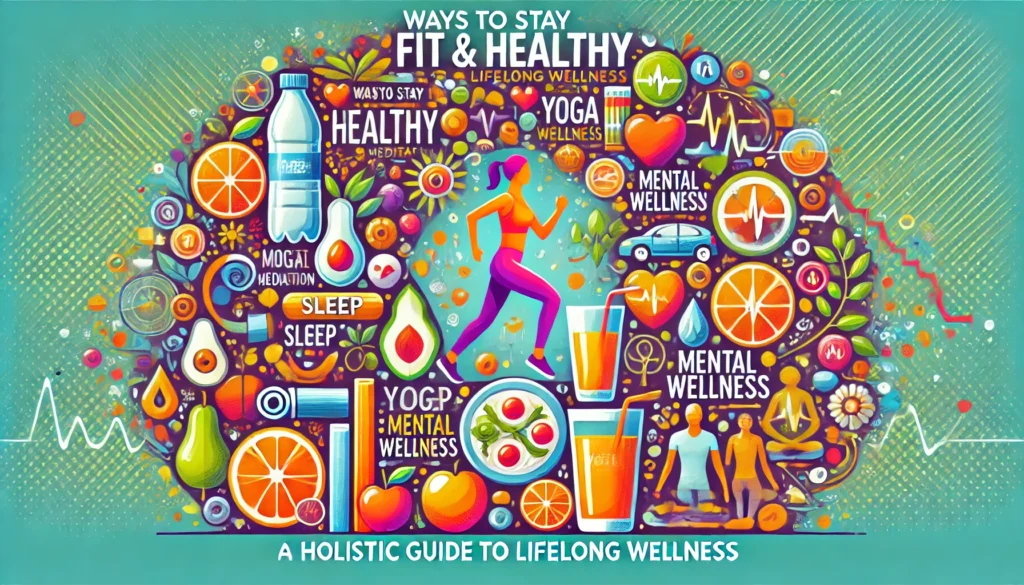
Staying fit and healthy is more than just a goal—it’s a lifestyle. In today’s fast-paced world, maintaining physical, mental, and emotional well-being can feel challenging, but it’s entirely achievable with the right approach. This blog dives deep into practical, sustainable ways to stay fit and healthy, covering everything from nutrition and exercise to mental health and lifestyle habits.
Why Staying Fit and Healthy Matters
Being fit and healthy isn’t just about looking good; it’s about feeling good and living a fulfilling life. A healthy lifestyle can:
- Boost your energy levels.
- Improve your mood and mental clarity.
- Reduce the risk of chronic diseases like diabetes, heart disease, and obesity.
- Enhance your quality of life and longevity.
1. Prioritize Nutrition
A balanced diet is the foundation of good health. What you eat directly impacts your energy, mood, and overall well-being.
a. Eat Whole, Nutrient-Dense Foods
Focus on foods that nourish your body:
- Fruits and Vegetables: Packed with vitamins, minerals, and antioxidants.
- Lean Proteins: Chicken, fish, tofu, beans, and legumes for muscle repair and growth.
- Whole Grains: Brown rice, quinoa, oats, and whole wheat for sustained energy.
- Healthy Fats: Avocados, nuts, seeds, and olive oil for brain and heart health.
b. Avoid Processed Foods
Limit foods high in sugar, salt, and unhealthy fats. These can lead to weight gain, inflammation, and chronic diseases.
c. Stay Hydrated
Water is essential for digestion, circulation, and overall health. Aim for 8-10 glasses a day, and more if you’re active.
d. Practice Portion Control
Overeating, even healthy foods, can lead to weight gain. Use smaller plates, eat slowly, and listen to your body’s hunger cues.
2. Exercise Regularly
Physical activity is crucial for maintaining fitness and preventing diseases. Find activities you enjoy to make exercise a sustainable part of your routine.
a. Cardiovascular Exercise
Activities like walking, running, cycling, or swimming improve heart health and burn calories. Aim for at least 150 minutes of moderate-intensity cardio per week.
b. Strength Training
Lifting weights or doing bodyweight exercises (like push-ups and squats) builds muscle, boosts metabolism, and strengthens bones. Include strength training 2-3 times a week.
c. Flexibility and Balance
Yoga, Pilates, or stretching exercises improve flexibility, reduce injury risk, and promote relaxation.
d. Stay Active Throughout the Day
Incorporate movement into your daily life:
- Take the stairs instead of the elevator.
- Walk or bike to work.
- Do household chores like gardening or cleaning.
3. Prioritize Mental Health
Mental and emotional well-being are just as important as physical health. A healthy mind supports a healthy body.
a. Manage Stress
Chronic stress can harm your health. Practice stress-relief techniques like:
- Meditation or mindfulness.
- Deep breathing exercises.
- Journaling or creative hobbies.
b. Get Enough Sleep
Sleep is essential for recovery and overall health. Aim for 7-9 hours of quality sleep each night. Create a bedtime routine and avoid screens before bed.
c. Build Strong Relationships
Social connections improve mental health and reduce stress. Spend time with loved ones, join community groups, or volunteer.
d. Seek Help When Needed
If you’re struggling with mental health issues like anxiety or depression, don’t hesitate to seek professional help.
4. Adopt Healthy Lifestyle Habits
Small, consistent changes can have a big impact on your overall health.
a. Avoid Smoking and Limit Alcohol
Smoking is a leading cause of preventable diseases, while excessive alcohol can harm your liver and overall health. Quit smoking and drink in moderation.
b. Practice Good Hygiene
Wash your hands regularly, brush and floss your teeth, and maintain personal hygiene to prevent illnesses.
c. Stay Consistent
Consistency is key to long-term health. Make small, sustainable changes rather than drastic, short-term fixes.
5. Regular Health Checkups
Preventive care is essential for staying healthy. Regular checkups can catch potential issues early and keep you on track.
a. Annual Physical Exams
Visit your doctor for routine screenings like blood pressure, cholesterol, and blood sugar tests.
b. Vaccinations
Stay up-to-date on vaccinations to protect against preventable diseases.
c. Dental and Eye Exams
Don’t neglect your oral and eye health. Schedule regular dental cleanings and eye exams.
6. Stay Motivated and Set Goals
Staying fit and healthy requires motivation and a clear plan.
a. Set SMART Goals
Make your goals Specific, Measurable, Achievable, Relevant, and Time-bound. For example, “I will walk 30 minutes a day, 5 days a week.”
b. Track Your Progress
Use a journal, app, or fitness tracker to monitor your progress and celebrate milestones.
c. Find a Support System
Surround yourself with people who encourage and support your health goals. Join fitness classes, online communities, or workout with a friend.
7. Embrace a Positive Mindset
Your attitude plays a significant role in your health journey.
a. Practice Gratitude
Focus on what you’re grateful for to boost your mood and motivation.
b. Be Kind to Yourself
Don’t beat yourself up over setbacks. Progress takes time, and every small step counts.
c. Stay Curious and Open-Minded
Try new activities, recipes, or wellness practices to keep your journey exciting and fulfilling.
Conclusion
Staying fit and healthy is a lifelong journey that requires balance, consistency, and self-care. By prioritizing nutrition, exercise, mental health, and healthy habits, you can achieve optimal well-being and enjoy a vibrant, fulfilling life. Remember, it’s not about perfection—it’s about progress. Start small, stay committed, and celebrate every step toward a healthier you.
What are your favorite ways to stay fit and healthy? Share your tips and experiences in the comments below!
